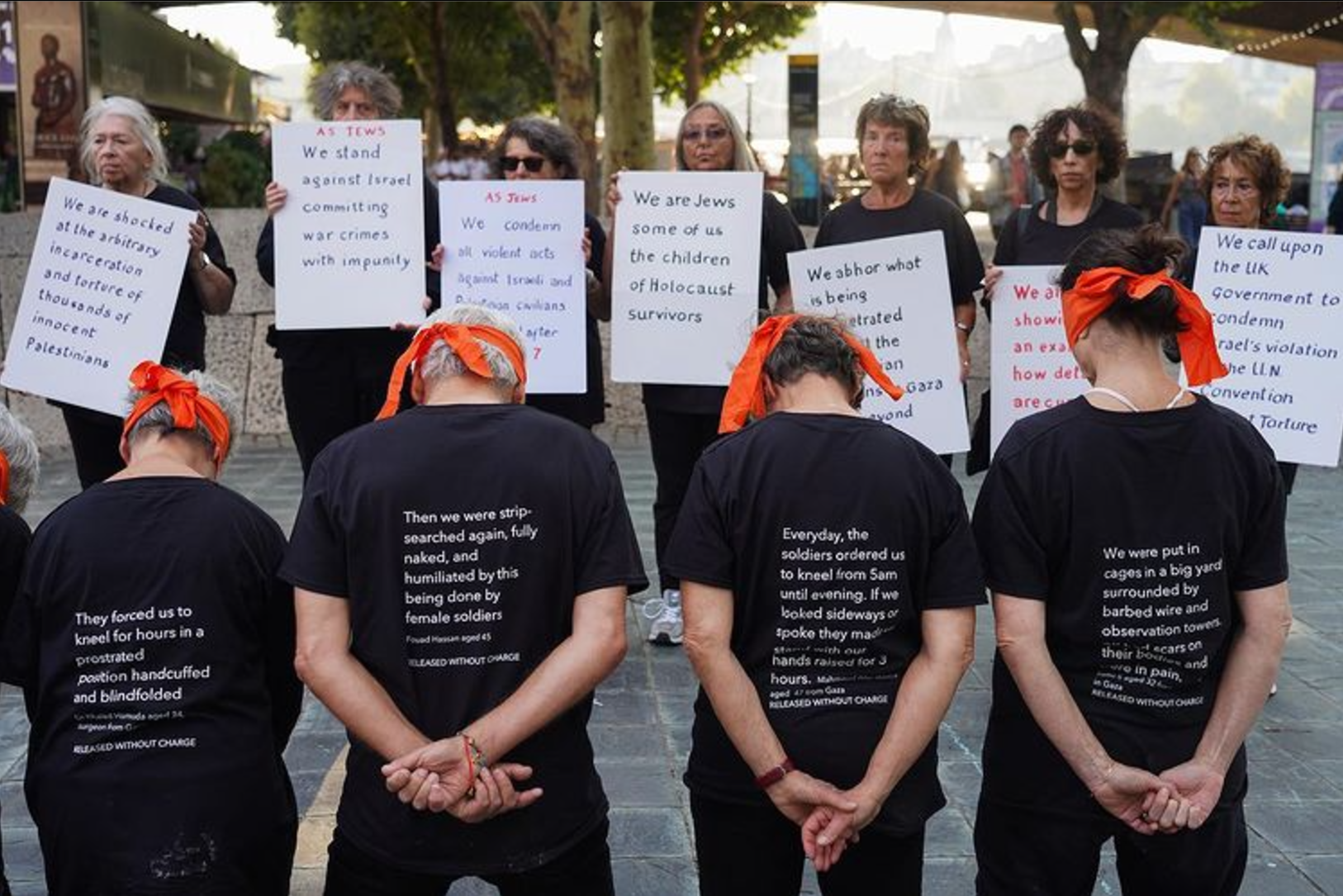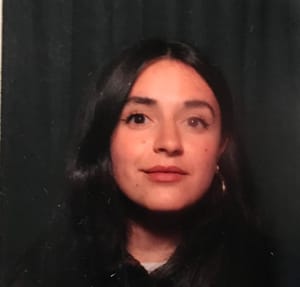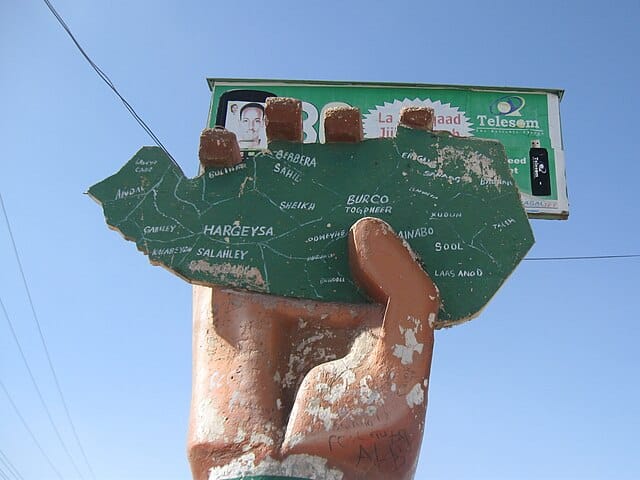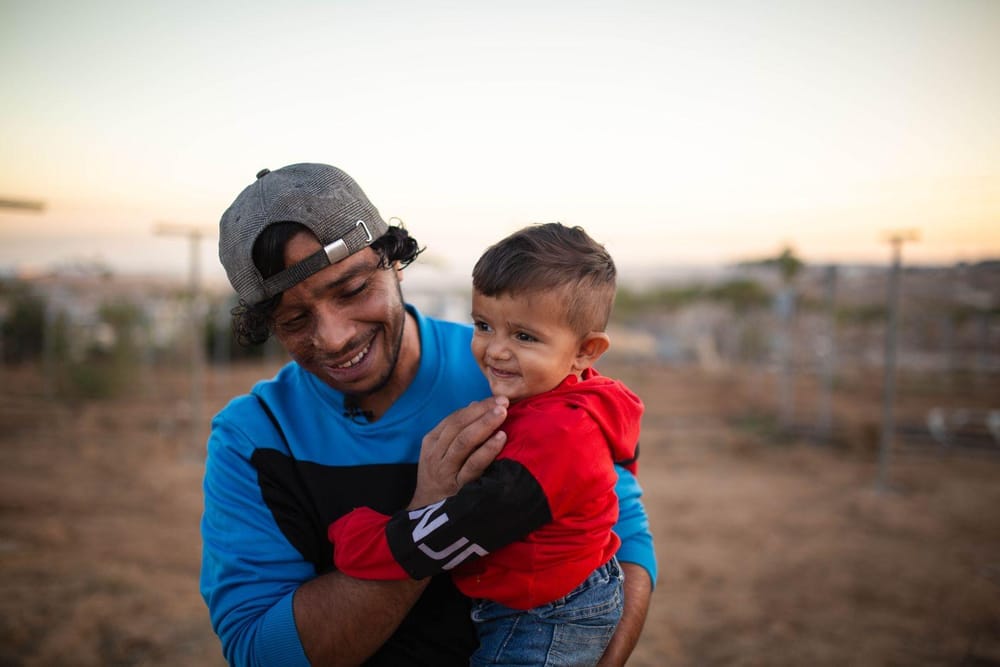Meet North London’s newly organised anti-Zionist elders
“We can’t be written off as young radicals.”

In the mass of photographs and footage from pro-Palestine protests shared around the world this year, one group seems to have garnered particular attention: older women. They’ve been captured marching, demonstrating outside political institutions, targeting weapons factories, sharing lessons from earlier activism at university encampments, and standing up to the police, with captions and placards often making a point of their age and sex.
To point this out is not, I hope, to be tokenistic. People of all ages are involved in activism and organising, and older women will necessarily be a part of that coalition. But many of those older women themselves seem to recognise the particular power their identity holds, in the way it rebukes the common association of “grannies” with frailty and makes an obvious lie of the establishment’s suggestion that pro-Palestine protesters are all naive youths. And it’s a power on which one new Jewish group, North London Peaceniks, is capitalising.
North London Peaceniks (NLPs) was formed earlier this year by a group of friends seeking to raise funds and awareness about the suffering of Palestinians under Israel’s occupation and bombardment. Their most recent action was a performance on London’s Southbank, in which they emulated the stress positions Palestinians are forced into in Israeli prisons. Here, they talk to Vashti about the family histories that made them anti-Zionists, the reactions in their communities, and the importance of making Jewish opposition to Israeli violence as visible as possible.
Francesca Newton: How did you, as individuals, come to feel the way you do about Israel and Palestine? Some of you are the children of Holocaust survivors: how does that identity affect your feelings about the situation?
Marsha Sanders: My feelings stem from a deep sense of injustice at Israeli cruelty towards Palestinians and the false premise on which Israel was established. I grew up in Zimbabwe in a very tight-knit Jewish community for whom loyalty to Israel was a given. I never questioned that until later in life and, although a member of Jews for Justice for Palestinians (JfJfP) for years, I hadn’t been particularly active until this war kicked off. The brutality, blatant impunity, disregard for international law, sense of superiority, and openly genocidal intent of the Israeli government and most of its citizens is deeply troubling to me as a Jew, especially in its similarity to apartheid South Africa.
Lyndall Stein: My grandparents left Lithuania at the turn of the last century and so the Holocaust is quite remote from my identity, but of course in our immediate circles were very close friends who had fled, including my mum’s best friend. The primary driver of my feelings now is my childhood in South Africa, where I witnessed first-hand the cruelty of the apartheid system; that informed my view of the world and is why I know we all have a responsibility to address inequality and human right abuses. Many of the white people who fought the apartheid system were Jewish and saw the parallels between Zionism and apartheid.
Ann Jungmann: My parents were from Berlin. All my grandparents died in camps. My levels of ignorance of Israel amaze me. I met a couple of Lebanese Christians when I was about 15, and it was only when they asked me what I thought about Israel that I woke up. They explained the history and my response was: “What about the people who were already there?” I have stayed with that view. My Israeli relatives no longer speak to me.
Sonja Linden: I was brought up in a post-war German refugee household in London. My mother had forsworn her orthodox Jewish identity completely on marrying my father, who was a German political refugee. So there was no JNF tin in the hall, no conversations about Israel or Zionism; these topics never came up. Come the 60s, I married my childhood sweetheart, who was not just Jewish but observant. At the time of the six-day war, my husband was keen to fly out and join the Israeli army. I assisted with administration for these volunteer fighters. In the end he didn’t go, but emotions ran high for both of us – the horror of “little Israel” being overpowered by these dastardly Arabs. The word “Palestinian” was largely absent from the Anglo-Jewish lexicon at that time, all part of the total ignorance of the Jewish community about the Palestinian narrative, their ethnic cleansing, and what was to become their subjugation under an increasingly oppressive occupation.
What changed? A new husband, that was one change, also Jewish but with more stress on the “ish”. Goodbye to the kosher home, hello to discussions about co-writing a play called Welcome to Ramallah with a fiercely anti-Zionist new friend. That co-writer, the late and deeply lamented Adah Kay, had been spending several months of every year with her husband in the West Bank while he taught architecture at Birzeit University and she researched a harrowing book, Stolen Youth, on the incarceration of Palestinian children. In order to deepen my understanding as her co-writer I also needed to visit “Palestine”, as I was gingerly just beginning to call it back in 2007.
The trip proved life-changing. Our tour was organised by the Israeli Committee Against House Demolitions (ICAHD) and was rigorous and intense. We made five visits a day over 10 days to engage with a huge cross-section of Palestinians, all in different locations in the West Bank. Two years later, ICAHD arranged a clinical tour of the West Bank for medical practitioners. I went on that too. We met doctors, heads of hospitals, psychiatrists, therapists, and social workers. The impact of the occupation on mental health needs alone, particularly of children, was overwhelming.
Underscoring all this was my awareness of my family history in Nazi Germany, including my father’s activism and my mother’s experience as a victim and witness of Nazi persecution in her hometown of Freiburg. She survived by the skin of her teeth, managing to gain entry into the UK on a domestic visa a couple of months before the war broke out. Her father and siblings survived through escape to Switzerland and the USA, but over half of her extended family was murdered in Auschwitz.
Any activism on my part is fuelled by rational analysis, conscious as I am how many of the ten stages of genocide, modelled on the genocide against the Jews and other groups, have been appropriated by Israel in its progressive subjugation of the Palestinian people. My journey has taken me from a belief in the necessity of Israel as a haven for people like my once-refugee mother to a belief in its status as a pariah state.
FN: How do you know each other as a group? How did you come together as North London Peaceniks specifically, and when?
MS: Lyndall and I were once colleagues at a community printers and both now work with refugees. She suggested, when the war started, that we have a fundraiser. I then talked to Ann and Sonja, who are also very old friends of mine, and we started meeting. North London Peaceniks slowly coalesced earlier this year over the organisation of a fundraiser.
SL: Marsha and Ann were friends of mine. Ann and I met Lyndall through Marsha. A few months into the Gaza war, Marsha, Ann and Lyndall were talking about doing something to support the Gazan population and I said I’d be happy to help. The idea of screening a short Palestinian film as a fundraiser came up, and Marsha got permission from filmmaker Farah Nabulsi to show her incredibly poignant film The Present.
Marsha then approached our local arts cinema in Crouch End and they offered us a free slot. The four of us were determined to fill all 90 seats, which we managed to do, ending up with a waiting list of over 20, all of whom made a donation irrespective of getting a seat. We fronted the screening with poems read by Palestinian and Jewish poets, including Michael Rosen, and invited our audience to gather and share thoughts in the foyer afterwards.
Many members of the audience told us how much they welcomed this opportunity not only to support the Gazan population, but, equally importantly, to be in a gathering of shared allegiances regarding our horror and disgust at the brutal war of attrition against Palestinian civilians, particularly those friends who had not participated or could not participate in any of the protest marches.
This first event raised over £3,000 for Medical Aid for Palestinians. By that point our quartet had started calling ourselves North London Peaceniks. Key for all of us was making it clear that we were Jews in opposition to what was being perpetrated against the Gazan population. In so doing we aimed to “give permission” to non-Jews to speak out without fear of being brandished antisemitic.
FN: What, for you, is the significance of being a group composed mainly of older women? Why do you choose to organise along those lines?
MS: For our performance piece we put out a call for participants through Jewish networks and the respondents were predominantly women. We’re not only women, but we feel that older Jewish women standing against Israel and for Palestinians makes a powerful statement. We can’t be written off as young radicals or antisemites.
SL: We started as all women as an extension of a friendship cluster. Our eldest member is now in her mid-80s and indefatigable. We then began to think that being older women had some power in itself: as elders, veterans of the ’60s generation and of the ’70s wave of feminism, but also, in our event re-enacting the abuse of Palestinian prisoners, in our apparent vulnerability.
LS: We felt we had a certain “moral authority” as older women. We could also be seen as less threatening.
AJ: There’s been an amazing esprit de corps. Whether that’s due to our being of the same gender, who knows. We hope to continue as a small coherent group of like-minded women but will certainly get together with anyone who shares our views for specific actions. The smallness and the cohesion of our group has been so effective, it seems a good idea to maintain it.
FN: How was the format of the performance you staged in September decided?
SL: Our performance piece on the Southbank was inspired by an evening at P21 Gallery set up by Jonathan Chadwick and Ruth Lass from Az Theatre on the subject of the torture and abuse of Palestinian detainees. Accounts of torture and abuse by a number of witnesses, including psychiatrist Dr Samah Jabr, the head of the Mental Health Unit for the Palestinian Ministry of Health, were livestreamed from Gaza. We also heard from Ahmed Tobasi, the artistic director of the Freedom Theatre in Jenin, about how he and his brother had been arrested without charge at his family home, and forced to sit in a line of male detainees, their legs parted, blindfolded, their hands cuffed behind their backs.
Through our networks we gathered together 20 Jewish participants, all women save one brave male. Those who were agile enough to sit in the position described took the role of prisoners; the remaining 10 held placards declaring our opposition to the abuse and torture. Everyone was wearing a black T-shirt, on the back of which was an extract of a testimony from an abused Palestinian detainee taken from an extensive report in August 2024 by Israeli Human Rights Organisation B’Tselem entitled Welcome to Hell.
LS: We also found sympathetic photographers and filmmakers who would record the protest, and it’s now on YouTube.
AJ: I’m now looking into organising a play reading about the Balfour Declaration. We’re all seeking out new ways to influence public opinion and emphasise Jewish opposition to the war.
FN: What was the response to that action? How were you received by other Jews particularly? Have there been disputes in your families/communities or have you found yourselves well-supported?
MS: Those friends and passersby who witnessed our performance were very moved and we’ve had some positive feedback on Instagram. A well-known Jewish photographer who put it up on Instagram was immediately blocked; apart from that, we’ve had no criticism. I have fallen out with family members over the whole issue, however, so I haven’t even tried to send it to them. Sadly, it’s mostly people of a similar persuasion who have seen it.
LS: I’ve had some negative comments from distant relatives and very difficult conversations with my favourite cousin and another friend. At the same time, so many Jewish supporters thanked us for setting up the two events we’ve held.
AJ: Since I’ve been associated with anti-Zionist activity since the 1980s, I’ve already been dropped by those who don’t agree with me.
SL: This has been a testing time for most Jews who have condemned Israel’s cruel and unlawful conduct. For me, it’s opened up differences with a socially liberal and much younger friend, although we’ve managed to remain friends. The same happened with an equally socially liberal colleague. The main dispute is from my husband’s family – his younger son, now 38, made aliyah at the age of 19 as a convert to orthodox Judaism. He is now married with four children, and has for years been a reservist on the Lebanon border. My husband has continued to maintain communication with him, but he is horrified that his son can have views so antipathetic to his own, and so hardline in terms of the need to preserve Jewish Israeli life at the cost of others.
FN: What further plans for organising do you have? Are you hoping to expand?
MS: We’d like to disseminate our action more widely and, ideally, have other groups reenact it. So far one small group, Hastings Jews for Justice, is planning to do it. We also now have a larger Peaceniks group comprising those who volunteered as prisoners and placard holders. They’re all keen to take it further.
AJ: As funds will be needed for the foreseeable future and beyond, we will have to continue both fundraising [for Gaza] and consciousness-raising among both Jews and non-Jews.
FN: Have you been involved in any other organising on this issue, for example by joining the Jewish bloc on the Palestine marches in central London? If so, how did you find the experience?
MS: I’ve been on several marches and up until now have always carried my banner which says: “Genocide is never the solution, as we Jews should know.” I get such positive feedback and many photographs taken.
LS: I’ve been on many of the Palestine marches in London. It’s very important to be in the Jewish Bloc, but in all the demos I’ve been on I’ve tried to indicate that I am of Jewish heritage. I’ve had amazing levels of support.
AJ: Alas, I am disabled; I’ve turned up to marches but not been able to keep up. But I plan to join a group of descendants of Holocaust survivors, who will stand with banners. I have also joined Women in Black, an anti-war group that protests the war outside Euston Station on Saturdays. I also regularly write letters to newspapers and MPs. The marches are inspiring. People are so pleased to see the Jewish Bloc. It’s time our actions and views were more commonly known.
SL: I’ve been a member of JfJfP and ICAHD for many years, and I’ve been on many of the marches. I’m sometimes joined by my daughter and enjoy marching with her. We speculate on how her late father would have felt about it, as a pro-Israel practising Jew who also had very socially liberal sympathies and who, with me, joined the Campaign Against Racial Discrimination in the ’60s, which ushered in the first Race Relations Act.
I have always experienced the marches as peaceful and friendly, and felt a sense of solidarity with people from so many different backgrounds. The maligning of the chant “From the river to the sea, Palestine will be free” I always find very ironic, since it’s precisely what successive Israeli governments have clearly been territorially working towards.
FN: What would serious action from the British government on Israel’s assault look like to you? Do you feel hopeful that peace can be achieved?
MS: I’m afraid I’m not hopeful. I believe that the US is not an innocent bystander but that Israel is, in fact, doing its bidding, and while there’s no desire for peace from the West and an appetite for confrontation with Iran, things will not change.
LS: I think the parliamentary seats that were lost to Labour because of its stance on Gaza will put pressure on the government. Labour’s action is too little, too late.
We in the UK, though, are small players. The change, if it comes, will be through the US, and that is really unpredictable right now. I was very impressed by Naomi Klein’s article about the boycott movement: that really clarified for me the importance of having pressure continue on all fronts.
We at NLPs have committed to being outspoken but also connecting around culture, theatre, film, writing, and the visual image, all of which have the power to reach hearts and minds but also to connect people in solidarity.
The horror and pain of Palestinian people and now of those in Lebanon mean we cannot lose hope. All we can give is a modest contribution, but all resistance counts.
AJ: Obviously, we need to stop all arms sales. The government should be more vocal in its criticism of Israel and stop going on about “Israel’s right to defend itself.” What is going on is not defence! Also, maybe it’s time the Board of Deputies and the Chief Rabbi were not the only ones listened to. What about the considerable voices, like ours, which totally disagree with the Jewish establishment?
SL: I’m incredulous that the bombing is still ongoing after a year, with Gaza looking like Dresden in the last World War. I think our government has an obligation under international law to stop all arms sales to Israel. Our political leadership should show more moral courage, particularly our prime minister, with his background as a human rights lawyer. Presenting the case for this under the aegis of international law is the way forward. The fear of displeasing 0.5% of the population, which is the current statistic for British Jews, seems pathetic, especially as we witness more and more British Jews finally waking up to the history and reality of Israel's decades-long subjugation of another people in the name of “security” and ethno-nationalism.
My only very slim hope for peace rests on the increasing recognition of Israel as a pariah state by peoples, if not governments, around the world. It is people, in particular Jews with a moral conscience, that need to be part of a movement pressuring their governments to promote policy changes that will allow for Palestinian self-determination and the re-definition of a geo-political entity in which Jewish Israelis can live peaceably with Palestinians.
Francesca Newton is an editor at Vashti.
Author

Francesca Newton is assistant editor at Tribune and an editor at Vashti. She currently lives in Melbourne.
Sign up for The Pickle and New, From Vashti.
Stay up to date with Vashti.



